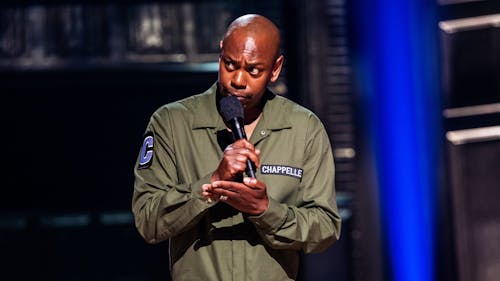Chappelle exposes flaw in 'cancel culture' critique: He's still here

From the Oedipus complex to formations of ego and id, Sigmund Freud’s groundbreaking work was foundational to the field of psychoanalysis. Though often disputed and in some cases delegitimized, many aspects of his theory still pervade our lingo and understanding of each other. One of Freud’s more popular theories was psychological projection, roughly defined as defending one’s self against unconscious impulses by ascribing them to others while denying them in yourself.
Unfortunately, claims of projection have recently been lobbed against someone I hold in high regard, comedian Dave Chappelle.
Let me go back. I was not the kind of kid who grew up watching “Chappelle's Show,” thanks to a pair of strict parents. Still, I found out about him through word of mouth during his decade-long absence from entertainment. Since distance makes the heart grow fonder, Chappelle was spoken of in reverential tones, as a comedic genius. And I still think that’s a fair assessment.
Along with Aaron McGruder — creator of “The Boondocks” — Chappelle is a large part of why I have a deeply cynical, vaguely absurdist approach to just about everything, especially issues of race and class. Chappelle always seemed to know what the jig was before it happened, understanding the inevitability of inequality and making light of it, even as it bore down on him and his audience.
I’m a longtime fan, and I’ve always enjoyed his work, up to his most recent specials. In fact, a portion of his latest special — the bit about Jussie Smollett — demonstrated everything I love about his comedy.
Still, the way he's addressed recent criticism is disappointing to say the least. His 2017 comeback special had some jokes about transgender folks that were seen as insensitive and people let him know about it. Then, in his new special “Dave Chappelle: Sticks & Stones,” he addressed the response from the LGBTQ+ community.
If you’ve watched both specials, you know exactly what I’m talking about. If not, you probably recognize the scenario through some other controversy. Collectively, we call it “cancel culture.”
Chappelle basically spent some time talking about how he sees the LGBTQ+ community as sensitive, Kevin Hart’s Oscars controversy and told a story about how Comedy Central’s Standards and Practices department had issues with homophobic slurs in sketches, but let him use anti-Black slurs with impunity. The story raised questions that may seem legitimate, but have pretty easy answers.
Gay comedians use homophobic slurs just as frequently as Black comedians use anti-Black slurs, which is just as frequently as disabled comedians use ableist slurs. It’s part of the therapeutically transgressive process of comedy, satire in its purest form. The issue is that Chapelle, who knows that fact far better than I do — he basically said it himself in the telling of the joke — decided to ignore the clear difference for cheap laughs.
I mean, let’s be honest, there’s absolutely no way he doesn’t understand the difference. He's been telling jokes for a living as long as I’ve been alive. When he let the punchline fly, it barely even sounded believable. He followed it up by saying the unspoken rule of comedy was that you can “never make fun of ‘the alphabet people,'” which, to be clear, isn’t true. Because, and it bears repeating, he said all of this on his widely advertised and widely viewed Netflix comedy special.
You’re allowed to make the LGBTQ+ community a punchline, and you can even do it poorly, as he clearly demonstrated. Chappelle just didn’t like the response that past jokes received and decided to project his sensitivity onto the industry at large.
Maybe being upset with the jokes because they weren’t “intellectually honest” is a bit highbrow of me, but it’s only because he’s rightfully held to a higher standard. For most of his career, Chappelle was the comedic equivalent of a no-hit pitcher, always on point.
Now he’s settling for laughs that aren’t just cheap, but indicative of someone who doesn’t really know how to respond to criticism. It seems like the more esteemed he's become, the more he's punched down with his humor rather than up.
For a long time, you could disagree with Chappelle on what he said, but you couldn’t argue that he was doing something interesting and new. Now, I don’t think the same claim can be made, and that’s a shame. Comedy is surely a place for projection, but a hallmark of quality comedy is when it's actually insightful.



